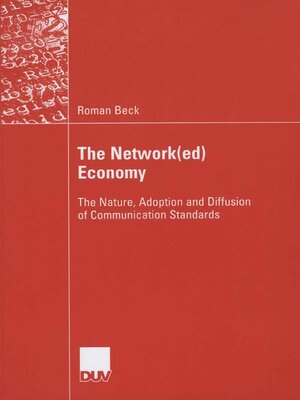The Network(ed) Economy
ebook ∣ The Nature, Adoption and Diffusion of Communication Standards
By Roman Beck

Sign up to save your library
With an OverDrive account, you can save your favorite libraries for at-a-glance information about availability. Find out more about OverDrive accounts.
Find this title in Libby, the library reading app by OverDrive.



Search for a digital library with this title
Title found at these libraries:
| Library Name | Distance |
|---|---|
| Loading... |
Modern communication channels together with new electronic media stan dards are constantly changing traditional interaction patterns of humans and even machines In an increasingly globalized and networked world. Such a communication-based interaction is of pivotal economic importance in order to manage efficiently inter-organizational cooperation and business information flows. Consequently, the availability of generally accepted electronic commu nication standards is essential in order to decrease communication-related transaction costs. Roman Beck elaborates in his dissertation The Network(ed) Economy the im portance of the so far independently from each other discussed diffusion the ory on the one hand and network effect theory on the other hand. However, Roman Beck not only connects the two theories epistemologically, but also develops and extends those theories by providing a network diffusion model. The core of his model is the so-called network effect helix, where a dynamic and self-enforcing interplay between direct and indirect network effects is de ployed to simulate diffusion patterns and paths of communication standards. In his analysis, Roman Beck especially focused on the critical diffusion period be tween the market launch of a new communication standard and (in case of a successful diffusion) the achievement of a critical mass of adopters. His re search results and consequently the chosen title of the thesis are capable to il lustrate the overall topic of his work in the interesting area between an incom pletely interconnected "networked economy" on the one hand and a com pletely interconnected "network economy".







